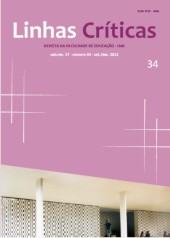The current relevance of school textbooks as curriculum resources
DOI:
https://doi.org/10.26512/lc.v17i34.3832Keywords:
Textbooks, Curriculum, Curricular resourceAbstract
It is a remarkable fact that the long history of the school textbook as an educational resource hasn’t affected its validity. On the contrary, over the first decade of the XX century, its relevance in the pedagogical processes tends to increase, as in case of the Chilean educational system. Therefore, it’s relevance as an educational resource and the complex dimensions implied by its presence in the classroom make of it a phenomenon of renewed interest for research and reflection. It is possible to establish many relationships between this resource and the curriculum, as a cultural and pedagogical artifact. It is viewed here from a critical perspective, in its roles as a device that translates the official curriculum, as a didactical material for teachers, and as a source of learning for students.
Downloads
References
AJAGÁN, Luis; TURRA, Omar. El texto escolar: hacia una didáctica crítica. REXE: Revista de Estudiosy Experiencias en Educación, v. 8, n. 16, p. 87-99, 2009.
ALZATE, Maria et al. Intervención, mediación pedagógica y los usos del texto escolar. Revista Ibero-americana de Educación, v. 37, n. 3, p. 1-15, 2005.
ARISTIZÁBAL, Magnolia. La categoría “saber pedagógico”: una estrategia metodológica para estudiarla relación pedagogía, currículo y didáctica. Revista Itinerantes, v. 4, p. 43-48, 2006.
ARTEAGA, Carmen; ALEMÁN, Pedro. Representación del Caribe en libros de texto de primaria venezolanos. Revista de Pedagogía, v. 28, n. 83, p. 335-360, 2007.
APPLE, Michael. El libro de texto y la política cultural. Revista de Educación, n. 301, p. 109-126, 1993.
______. Política cultural y educación. Madrid: Morata. 2001.
BLANCO, Nieves. Materiales curriculares: los libros de texto. In: BLANCO, Nieves; ANGULO, José(Coord.). Teoría y desarrollo del currículum.Málaga: Aljibe, 1994. p. 263-279.
CHEVALLARD, Yves. La transposition didactique: du savoir savant au savoir enseigné. París: La PenséeSauvage, 1985.
EGUREN, Mariana; BELAÚNDE, Carolina; GONZÁLEZ, Natalia. Repensando el texto educativo desdesu uso: un diagnóstico para la escuela urbana. Lima: IEP, 2003. Disponível em: <http://cies.org.pe/files/documents/investigaciones/educacion/repesando-el-texto-escolar-desde-su-uso-un-diagnostico-para-la-escuela-urbana.pdf >. Acesso em: 14 dez. 2010.
ESCUDERO, Juan Manuel (Ed.). Diseño, desarrollo e innovación del currículum. Madrid: Síntesis, 2007.
FERRADA, Donatila. Currículum crítico comunicativo. Barcelona: El Roure, 2001.
FONTAINE, Loreto; EYZAGUIRRE, Bárbara. Por qué es importante el texto escolar. In: ______.;______. (Ed.). El futuro en riesgo: nuestros textos escolares. Santiago: CEP, 1997. p. 355-369.
GIMENO SACRISTÁN, José. El currículum: una reflexión sobre la práctica. Madrid: Morata, 2002.
GRUNDY, Shirley. Producto o praxis del currículum. Madrid: Morata, 1998.
GRUPO ELEUTERIO QUINTANILLA. Libros de texto y diversidad cultural. Madrid: Talasa, 1998.
GÜEMES, Rosa María. Libros de texto y desarrollo del currículo en el aula: un estudio de casos. 1994.Tese (Doutorado) ”“ Universidade de La Laguna, Tenerife, 1994.
MAGENDZO, Abraham; TOLEDO, María Isabel. Educación en Derechos Humanos: curriculum historiay ciencias sociales del 2° año de enseñanza media. Subunidad “Régimen militar y transición a laDemocracia”. Estudios Pedagógicos, v. 35, n. 1, p. 139-154, 2009.
MARTÃNEZ, María Cristina. Análisis del discurso y práctica pedagógica: una propuesta para leer,escribir y aprender mejor. Cali: Homo Sapiens, 2001.
MARTÃNEZ BONAFÉ, Jaume. Políticas del texto escolar. Madrid: Morata, 2002.
MINISTERIO DE EDUCACIÓN DE CHILE. Política de textos escolares. Santiago: Unidad de Currículumy Evaluación, 2009a. Disponível em: <http://portal.textosescolares.cl/imagen/File/pdf/folleto_politica.pdf>. Acesso em: 14 jan. 2011.
______. Seguimiento al Uso de los Textos Escolares en la formación Docente. Santiago: Centro deDocumentación, 2009b. (Textos Escolares). Disponível em: <http://portal.textosescolares.cl/imagen/File/Centro_Documentacion/Estudios/Seguimiento_uso_Txt_Esc_formacion_docente_2.pdf>. Acessoem: 24 jan. 2011.
______. Innovaciones en la provisión de textos escolares y como estas aseguran la calidad de lostextos. 2009c. Disponível em: <http://portal.textosescolares.cl/imagen/File/Centro_Documentacion/Presentaciones/Innovaciones_txt_escolares.ppt>. Acesso em: 12 fev. 2011.
______. Estudio de seguimiento al uso de Textos Escolares. Informe Final. Santiago: Centro de Documentación. 2010. (Textos Escolares). Disponível em: <http://portal.textosescolares.cl/imagen/File/Centro_Documentacion/Estudios/Tomo_1_Informe_Final_sitioweb.pdf >. Acesso em: 16 fev. 2011.
MORALES, Gladys; KISS, Diana; GUARDA, Alicia. El Libro de Texto Escolar como interventor sociocultural en la construcción de la identidad cultural. Impulso: Revista de Ciencias Sociales y Humanas,v. 17, n. 42, p. 21-28, 2005.
MOYA, Constanza. Aproximación al concepto y tratamiento de texto escolar. Cuadernos de LingüísticaHispánica, n, 11, p. 133-152, 2008.
PALACIO, Luz; RAMÃREZ, Marta. Reflexiones sobre el texto escolar como dispositivo. Revista Educación y Pedagogía, v. 10, n. 21, p. 217-236, 2008.
RAMÃREZ, Tulio. Los maestros venezolanos y los textos escolares: una aproximación a las representaciones sociales a partir del análisis de segmentación. Revista de Pedagogía, v. 28, n. 82, p. 225-260, 2007.
SOTO, Viola. Políticas, acciones curriculares y reforma de la educación en Chile. REXE: Revista deEstudios y Experiencias en Educación, v. 1, n. 1, p. 57- 74, 2002.
TORRES SANTOMÉ, Jurjo. El curriculum oculto. Madrid: Morata, 1991.
TRUNEANU, Valentina. Análisis de los textos escolares para la enseñanza de la literatura en EducaciónMedia Diversificada. Revista de Ciencias Humanas y Sociales, v. 21, n. 46, p. 102-123, 2005.
VALLS, Rafael. Los estudios sobre los manuales escolares de historia y sus nuevas perspectivas.Didáctica de las Ciencias Experimentales y Sociales, n. 15, p. 23-36, 2001.
Downloads
Published
How to Cite
Issue
Section
License
Copyright (c) 2016 Linhas Críticas

This work is licensed under a Creative Commons Attribution 4.0 International License.
Authors who publish in this journal agree to the following terms:
-Authors maintains the copyright and grants the journal the right of first publication, the work being simultaneously licensed under the Creative Commons Attribution License which allows the sharing of the work with recognition of the authorship of the work and initial publication in this journal.
- Authors are authorized to enter into additional contracts separately, for non-exclusive distribution of the version of the work published in this journal (eg publish in institutional repository or as a book chapter), with acknowledgment of authorship and initial publication in this journal.
-Authorers are allowed and encouraged to publish and distribute their work online (eg in institutional repositories or on their personal page) at any point before or during the editorial process, as this can generate productive changes as well as increase the impact and the citation of published work (See The Effect of Free Access).



